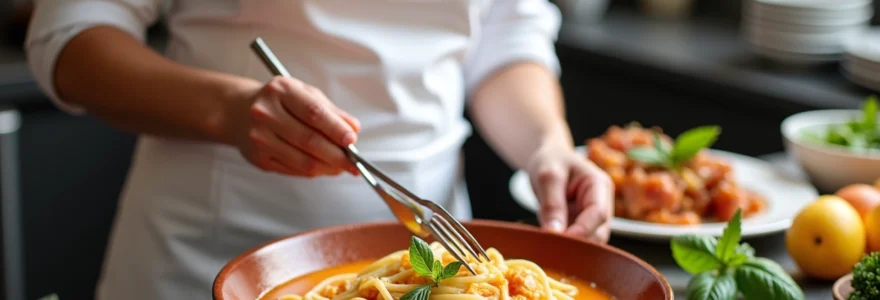Travelling offers a unique opportunity to immerse oneself in diverse cultures, and there’s no better way to do so than through the universal language of food. Cooking classes abroad have emerged as an increasingly popular way for travellers to engage with local traditions, flavours, and culinary techniques. These experiences offer far more than just a chance to learn new recipes; they provide a gateway to understanding the heart and soul of a destination through its cuisine.
As you explore bustling markets, interact with local chefs, and learn time-honoured cooking methods, you’ll find that these classes offer a depth of experience that goes far beyond typical tourist activities. The skills and knowledge gained become a lasting souvenir, one that can be shared with friends and family long after the journey has ended. Let’s delve into why cooking classes abroad are truly the best souvenirs you can bring home from your travels.
Culinary immersion: transforming travel experiences through local cuisine
Culinary immersion through cooking classes abroad offers a unique perspective on local culture that typical sightseeing simply cannot match. By engaging with food preparation techniques, ingredient selection, and traditional recipes, travellers gain invaluable insights into the daily lives and customs of their host country. This hands-on approach to cultural exploration creates lasting memories and a deeper appreciation for the nuances of global cuisines.
Moreover, cooking classes provide an opportunity to interact with local chefs and food enthusiasts in a way that breaks down language barriers and fosters genuine connections. You’ll find yourself chopping vegetables alongside fellow travellers and locals alike, sharing stories and laughter as you work together to create a delicious meal. This camaraderie often leads to unexpected friendships and a more authentic travel experience.
The sensory journey of a cooking class abroad is unparalleled. From the vibrant colours of fresh produce in local markets to the aromatic spices wafting through the air, every moment engages your senses in a way that creates vivid, lasting memories. These experiences become etched in your mind, allowing you to revisit your travels each time you recreate a dish in your home kitchen.
Mastering regional techniques: from paella in spain to pad thai in thailand
One of the most rewarding aspects of cooking classes abroad is the opportunity to master regional techniques that have been perfected over generations. Each country and region boasts its own unique methods and specialities, and learning these first-hand from expert local chefs is an invaluable experience. Let’s explore some iconic dishes and the techniques you might learn in various destinations around the world.
Spanish paella workshops in valencia: perfecting Saffron-Infused rice
In the birthplace of paella, Valencia, you’ll find workshops dedicated to perfecting this iconic Spanish dish. Here, you’ll learn the art of creating the perfect socarrat – the crispy bottom layer of rice that is the hallmark of a well-made paella. Chefs will guide you through the process of selecting the right rice, preparing the sofrito base, and understanding the crucial timing required to achieve the ideal texture and flavour balance.
You’ll discover how to properly toast the rice grains before adding the broth, a technique that ensures each grain remains distinct and absorbs the flavours of the dish. The use of saffron, Spain’s prized spice, will be demystified as you learn to incorporate its delicate aroma and distinctive golden hue into your paella.
Thai cooking classes in chiang mai: balancing sweet, sour, salty, and spicy
In the culinary heart of Northern Thailand, Chiang Mai offers an abundance of cooking classes that teach the fundamental principles of Thai cuisine. Here, you’ll learn the art of balancing the four key flavours: sweet, sour, salty, and spicy. This delicate equilibrium is at the core of Thai cooking and mastering it will transform your understanding of Southeast Asian flavours.
Techniques such as pounding fresh herbs and spices in a mortar and pestle to create aromatic curry pastes will become second nature. You’ll learn to wok-fry with precision, understanding the importance of high heat and quick movements to achieve the perfect wok hei – that elusive smoky flavour that characterises great Thai stir-fries.
Pasta-making in bologna: Hands-On lessons in italian culinary tradition
Bologna, often referred to as “La Grassa” (The Fat One) due to its rich culinary heritage, is the ideal place to learn the art of pasta-making. In small, intimate classes, you’ll discover the secrets behind creating silky smooth pasta dough using nothing more than flour and eggs. The technique of kneading and resting the dough to achieve the perfect texture becomes an intuitive skill under the guidance of experienced sfogline (pasta makers).
You’ll learn to shape various pasta types by hand, from the iconic tagliatelle to the more intricate tortellini. The importance of pairing each pasta shape with the right sauce becomes clear as you create traditional Bolognese ragù to complement your handmade tagliatelle.
Sushi rolling in tokyo: mastering nigiri and maki techniques
In the bustling heart of Tokyo, sushi-making classes offer an insight into one of Japan’s most revered culinary arts. You’ll learn the meticulous process of preparing sushi rice, understanding the delicate balance of vinegar, sugar, and salt that gives it its distinctive flavour and texture. The art of hand-forming nigiri sushi becomes a meditation in precision and touch.
Mastering the technique of rolling maki sushi with a bamboo mat reveals the importance of ingredient placement and tension in creating perfectly cylindrical rolls. You’ll gain an appreciation for the itamae (sushi chef) culture, learning about the years of dedication required to perfect these seemingly simple techniques.
Cultural exchange through the kitchen: beyond recipe learning
Cooking classes abroad offer far more than just culinary skills; they provide a unique platform for cultural exchange. As you chop, stir, and taste alongside local chefs and fellow travellers, you’ll find yourself engaged in conversations that go beyond the kitchen. These interactions offer invaluable insights into local customs, traditions, and daily life that you might not encounter in typical tourist experiences.
In many cultures, food preparation is a social activity, bringing families and communities together. By participating in cooking classes, you’re not just learning recipes; you’re being invited into this intimate aspect of local culture. You might find yourself discussing family traditions, seasonal celebrations, or even personal stories with your instructors and classmates, all while working together to create a shared meal.
Moreover, cooking classes often incorporate visits to local markets or farms, providing a deeper understanding of the food supply chain and agricultural practices in the region. This farm-to-table experience helps travellers appreciate the terroir – the environmental factors that influence the taste and quality of ingredients – and understand how it shapes local cuisine.
Food is our common ground, a universal experience that brings people together in a way that transcends language and cultural barriers.
This quote encapsulates the essence of cultural exchange through cooking classes abroad. As you learn to recreate local dishes, you’re not just memorising recipes; you’re absorbing the stories, traditions, and values that have shaped these culinary practices over generations.
Sustainable souvenir: skills that last a lifetime
Unlike traditional souvenirs that often end up collecting dust on a shelf, the skills acquired in cooking classes abroad are truly sustainable mementos of your travels. These culinary techniques and recipes become a part of your repertoire, allowing you to relive your travel experiences time and time again in your own kitchen.
The sustainability of these skills extends beyond personal enjoyment. By learning to cook authentic dishes from around the world, you’re preserving culinary traditions and sharing them with others. This act of cultural preservation through cooking is particularly significant in an era where globalisation often threatens to homogenise food cultures.
Furthermore, the knowledge gained in these classes often extends to understanding sustainable food practices. Many cooking schools emphasise the importance of using local, seasonal ingredients and reducing food waste – principles that can be applied to your everyday cooking habits back home. This newfound awareness can lead to more environmentally conscious food choices and a reduction in your carbon footprint.
The skills learned in cooking classes abroad also offer a unique way to connect with others long after your trip has ended. Hosting dinner parties featuring dishes from your travels becomes a way to share your experiences with friends and family, creating new memories while reminiscing about past adventures. In this way, the culinary souvenirs from your travels continue to give back, enriching your life and the lives of those around you.
Gastronomic tourism: exploring local markets and ingredient sourcing
An integral part of many cooking classes abroad is the exploration of local markets and the process of ingredient sourcing. This aspect of culinary tourism offers a unique glimpse into the heart of a region’s food culture, providing invaluable lessons in seasonality, quality, and the importance of fresh, local produce.
Market tours guided by experienced chefs or local food experts are often included in cooking class packages. These tours go beyond mere shopping trips; they’re immersive cultural experiences that teach you how to select the best ingredients, understand local food systems, and interact with vendors in the local language.
Navigating mercado de san miguel in madrid: selecting premium iberian ham
In Madrid’s iconic Mercado de San Miguel, you might find yourself learning the art of selecting premium Iberian ham. Expert guides will teach you to distinguish between different grades of ham, explaining the nuances of curing processes and the impact of the pigs’ diet on flavour. You’ll learn to appreciate the marbling and aroma that indicate a high-quality jamón ibérico.
This experience not only enhances your appreciation for this Spanish delicacy but also provides insight into the cultural significance of ham in Spanish cuisine and social life. You’ll leave with the knowledge to select and serve quality ham, a skill that will impress at any future dinner party.
Herb identification at marché provençal in antibes: mastering french herbes de provence
In the fragrant markets of Provence, cooking class participants might find themselves on a sensory journey through the world of herbs. At Marché Provençal in Antibes, you’ll learn to identify and select the perfect blend of herbs that make up the iconic Herbes de Provence mixture.
Expert guides will teach you to distinguish between different varieties of thyme, rosemary, and oregano, explaining how each contributes to the overall flavour profile of Provençal cuisine. You’ll gain an understanding of how these herbs are grown, harvested, and dried, and learn about their traditional uses in both culinary and medicinal contexts.
Spice selection at istanbul’s grand bazaar: decoding turkish cuisine’s aromatic palette
A visit to Istanbul’s Grand Bazaar as part of a Turkish cooking class offers an unparalleled opportunity to explore the world of spices. Here, you’ll learn to navigate the maze-like structure of the bazaar, identifying quality spices by their colour, aroma, and texture.
Expert spice merchants will guide you through the process of selecting the perfect blend for Turkish classics like adana kebab or pide . You’ll learn about the historical Spice Route and how it has influenced Turkish cuisine, gaining a deeper appreciation for the cultural significance of spices in this region.
These market experiences not only enhance your cooking skills but also provide a deeper understanding of the cultural and economic importance of food in different societies. They allow you to engage with local producers and vendors, fostering a connection to the community that goes beyond typical tourist interactions.
From class to home kitchen: adapting international recipes for everyday cooking
One of the most rewarding aspects of taking cooking classes abroad is the ability to bring these international flavours and techniques back to your home kitchen. However, adapting recipes learned in their native environment to your everyday cooking can present both challenges and opportunities for creativity.
Firstly, it’s important to understand that ingredient availability may differ in your home country. Learning to substitute ingredients while maintaining the essence of a dish is a valuable skill. For example, if you can’t find fresh kaffir lime leaves for your Thai curry, you might use a combination of lime zest and bay leaves to achieve a similar aromatic profile.
Adapting cooking techniques to your available equipment is another crucial aspect. While you may have used a traditional tandoor oven in India, you can achieve similar results with a very hot conventional oven or even a grill. The key is to understand the principles behind the cooking method and find creative ways to replicate them with the tools at your disposal.
Consider creating a global pantry in your kitchen, stocking up on key ingredients from different cuisines. This might include items like good quality olive oil, soy sauce, coconut milk, and a variety of spices. Having these staples on hand makes it easier to recreate international dishes on a whim.
Cooking is all about people. Food is maybe the only universal thing that really has the power to bring everyone together. No matter what culture, everywhere around the world, people eat together.
This quote reminds us of the unifying power of food. As you bring these international recipes into your home, you’re not just cooking; you’re sharing cultures and experiences with your loved ones. Host themed dinner parties featuring cuisines from your travels, inviting friends to join in the cooking process. This not only allows you to practice your skills but also spreads the joy of culinary exploration.
Remember that authenticity in home cooking is about capturing the spirit of a dish rather than adhering strictly to traditional methods. Feel free to experiment and adapt recipes to suit your tastes and lifestyle. The confidence gained from your cooking classes abroad should empower you to trust your instincts and create your own fusion of flavours.
By integrating the techniques and flavours learned in your cooking classes abroad into your everyday cooking, you’re not just recreating meals; you’re continuing a journey of culinary discovery. Each time you prepare a dish inspired by your travels, you’re reliving those experiences and sharing them with others, making your cooking class souvenirs truly priceless.


